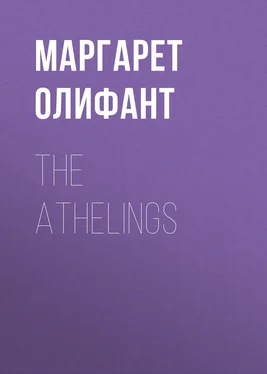Маргарет Олифант - The Athelings
Здесь есть возможность читать онлайн «Маргарет Олифант - The Athelings» — ознакомительный отрывок электронной книги совершенно бесплатно, а после прочтения отрывка купить полную версию. В некоторых случаях можно слушать аудио, скачать через торрент в формате fb2 и присутствует краткое содержание. Жанр: foreign_prose, literature_19, foreign_antique, на английском языке. Описание произведения, (предисловие) а так же отзывы посетителей доступны на портале библиотеки ЛибКат.
- Название:The Athelings
- Автор:
- Жанр:
- Год:неизвестен
- ISBN:нет данных
- Рейтинг книги:5 / 5. Голосов: 1
-
Избранное:Добавить в избранное
- Отзывы:
-
Ваша оценка:
- 100
- 1
- 2
- 3
- 4
- 5
The Athelings: краткое содержание, описание и аннотация
Предлагаем к чтению аннотацию, описание, краткое содержание или предисловие (зависит от того, что написал сам автор книги «The Athelings»). Если вы не нашли необходимую информацию о книге — напишите в комментариях, мы постараемся отыскать её.
The Athelings — читать онлайн ознакомительный отрывок
Ниже представлен текст книги, разбитый по страницам. Система сохранения места последней прочитанной страницы, позволяет с удобством читать онлайн бесплатно книгу «The Athelings», без необходимости каждый раз заново искать на чём Вы остановились. Поставьте закладку, и сможете в любой момент перейти на страницу, на которой закончили чтение.
Интервал:
Закладка:
He was now an institution, recognised and respected. No one dreamt of investigating his claims—possession was the whole law in his case, his charter and legal standing-ground; and the young commonwealth recognised as undoubtingly the place of Mr Foggo as they did the natural throne and pre-eminence of Papa and Mamma.
“For my part,” said Mr Foggo, who, it seemed, was in the midst of what Mrs Atheling called a “sensible conversation,”—and Mr Foggo spoke slowly, and with a certain methodical dignity,—“for my part, I see little in the art of politics, but just withholding as long as ye can, and giving as little as ye may; for a statesman, ye perceive, be he Radical or Tory, must ever consent to be a stout Conservative when he gets the upper hand. It’s in the nature of things—it’s like father and son—it’s the primitive principle of government, if ye take my opinion. So I am never sanguine myself about a new ministry keeping its word. How should it keep its word? Making measures and opposing them are two as different things as can be. There’s father and son, a standing example: the young man is the people and the old man is the government,—the lad spurs on and presses, the greybeard holds in and restrains.”
“Ah, Foggo! all very well to talk,” said Mr Atheling; “but men should keep their word, government or no government—that’s what I say. Do you mean to tell me that a father would cheat his son with promises? No! no! no! Your excuses won’t do for me.”
“And as for speaking of the father and son, as if it was natural they should be opposed to each other, I am surprised at you , Mr Foggo,” said Mrs Atheling, with emphatic disapproval. “There’s my Charlie, now, a wilful boy; but do you think he would set his face against anything his papa or I might say?”
“Charlie,” said Mr Foggo, with a twinkle of the grey-brown eye which shone clear and keen under folds of eyelid and thickets of eyebrow, “is an uncommon boy. I’m speaking of the general principle, not of exceptional cases. No! men and measures are well enough to make a noise or an election about; but to go against the first grand rule is not in the nature of man.”
“Yes, yes!” said Mr Atheling, impatiently; “but I tell you he’s broken his word—that’s what I say—told a lie, neither more nor less. Do you mean to tell me that any general principle will excuse a man for breaking his promises? I challenge your philosophy for that.”
“When ye accept promises that it’s not in the nature of things a man can keep, ye must even be content with the alternative,” said Mr Foggo.
“Oh! away with your nature of things!” cried Papa, who was unusually excited and vehement,—“scarcely civil,” as Mrs Atheling assured him in her private reproof. “It’s the nature of the man, that’s what’s wrong. False in youth, false in age,—if I had known!”
“Crooked ways are ill to get clear of,” said Mr Foggo oracularly. “What’s that you’re about, Charlie, my boy? Take you my advice, lad, and never be a public man.”
“A public man! I wish public men had just as much sense,” said Mrs Atheling in an indignant under-tone. This good couple, like a great many other excellent people, were pleased to note how all the national businesses were mismanaged, and what miserable ’prentice-hands of pilots held the helm of State.
“I grant you it would not be overmuch for them,” said Mr Foggo; “and speaking of government, Mrs Atheling, Willsie is in trouble again.”
“I am very sorry,” exclaimed Mrs Atheling, with instant interest. “Dear me, I thought this was such a likely person. You remember what I said to you, Agnes, whenever I saw her. She looked so neat and handy, I thought her quite the thing for Miss Willsie. What has she done?”
“Something like the Secretary of State for the Home Department,” said Mr Foggo,—“made promises which could not be kept while she was on trial, and broke them when she took office. Shall I send the silly thing away?”
“Oh, Mr Foggo! Miss Willsie was so pleased with her last week—she could do so many things—she has so much good in her,” cried Marian; “and then you can’t tell—you have not tried her long enough—don’t send her away!”
“She is so pretty, Mr Foggo,” said Agnes.
Mr Foggo chuckled, thinking, not of Miss Willsie’s maid-servant, but of the Secretary of State. Papa looked at him across the fireplace wrathfully. What the reason was, nobody could tell; but Papa was visibly angry, and in a most unamiable state of mind: he said “Tush!” with an impatient gesture, in answer to the chuckle of his opponent. Mr Atheling was really not at all polite to his friend and guest.
But we presume Mr Foggo was not sensitive—he only chuckled the more, and took a pinch of snuff. The snuff-box was a ponderous silver one, with an inscription on the lid, and always revealed itself most distinctly, in shape at least, within the brown waistcoat-pocket of its owner. As he enjoyed this refreshment, the odour diffused itself more distinctly through the apartment, and a powdery thin shower fell from Mr Foggo’s huge brown fingers. Susan’s cat, if she comes early to the parlour, will undoubtedly be seized with many sneezes to-morrow.
But Marian, who was innocently unconscious of any double meaning, continued to plead earnestly for Miss Willsie’s maid. “Yes, Mr Foggo, she is so pretty,” said Marian, “and so neat, and smiles. I am sure Miss Willsie herself would be grieved after, if she sent her away. Let mamma speak to Miss Willsie, Mr Foggo. She smiles as if she could not help it. I am sure she is good. Do not let Miss Willsie send her away.”
“Willsie is like the public—she is never content with her servants,” said Mr Foggo. “Where’s all the poetry to-night? no ink upon Agnes’s finger! I don’t understand that.”
“I never write poetry, Mr Foggo,” said Agnes, with superb disdain. Agnes was extremely annoyed by Mr Foggo’s half-knowledge of her authorship. The old gentleman took her for one of the young ladies who write verses, she thought; and for this most amiable and numerous sisterhood, the young genius, in her present mood, had a considerable disdain.
“And ink on her finger! You never saw ink on Agnes’s finger—you know you never did!” cried the indignant Marian. “If she did write poetry, it is no harm; and I know very well you only mean to tease her: but it is wrong to say what never was true.”
Mr Foggo rose, diffusing on every side another puff of his peculiar element. “When I have quarrelled with everybody, I reckon it is about time to go home,” said Mr Foggo. “Charlie, step across with me, and get some nonsense-verses Willsie has been reading, for the girls. Keep in the same mind, Agnes, and never write poetry—it’s a mystery; no man should meddle with it till he’s forty—that’s my opinion—and then there would be as few poets as there are Secretaries of State.”
“Secretaries of State!” exclaimed Papa, restraining his vehemence, however, till Mr Foggo was fairly gone, and out of hearing—and then Mr Atheling made a pause. You could not suppose that his next observation had any reference to this indignant exclamation; it was so oddly out of connection that even the girls smiled to each other. “I tell you what, Mary, a man should not be led by fantastic notions—a man should never do anything that does not come directly in his way,” said Mr Atheling, and he pushed his grizzled hair back from his brow with heat and excitement. It was an ordinary saying enough, not much to be marvelled at. What did Papa mean?
“Then, papa, nothing generous would ever be done in the world,” said Marian, who, somewhat excited by Mr Foggo, was quite ready for an argument on any subject, or with any person.
Читать дальшеИнтервал:
Закладка:
Похожие книги на «The Athelings»
Представляем Вашему вниманию похожие книги на «The Athelings» списком для выбора. Мы отобрали схожую по названию и смыслу литературу в надежде предоставить читателям больше вариантов отыскать новые, интересные, ещё непрочитанные произведения.
Обсуждение, отзывы о книге «The Athelings» и просто собственные мнения читателей. Оставьте ваши комментарии, напишите, что Вы думаете о произведении, его смысле или главных героях. Укажите что конкретно понравилось, а что нет, и почему Вы так считаете.












